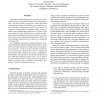1073 search results - page 44 / 215 » Formal Program Development with Approximations |
109
click to vote
PKDD
2009
Springer
15 years 8 months ago
2009
Springer
Abstract. Innovations such as optimistic exploration, function approximation, and hierarchical decomposition have helped scale reinforcement learning to more complex environments, ...
134
Voted
FMICS
2008
Springer
15 years 3 months ago
2008
Springer
Lustre is a formal synchronous declarative language widely used for modeling and specifying safety-critical applications in the elds of avionics, transportation or energy productio...
155
click to vote
FIW
2009
15 years 2 days ago
2009
Abstract. The idea of feature-oriented programming is to map requirements to features, concepts that can be composed to form a software product. Change-oriented programming (ChOP),...
135
click to vote
HICSS
2000
IEEE
15 years 6 months ago
2000
IEEE
Distributed multithreaded software systems are becoming more and more important in modern networked environment. For these systems, concurrency control and thread synchronization ...
108
click to vote
PPDP
2005
Springer
15 years 7 months ago
2005
Springer
Huet and Lang (1978) presented a framework of automated program transformation based on lambda calculus in which programs are transformed according to a given program transformati...

